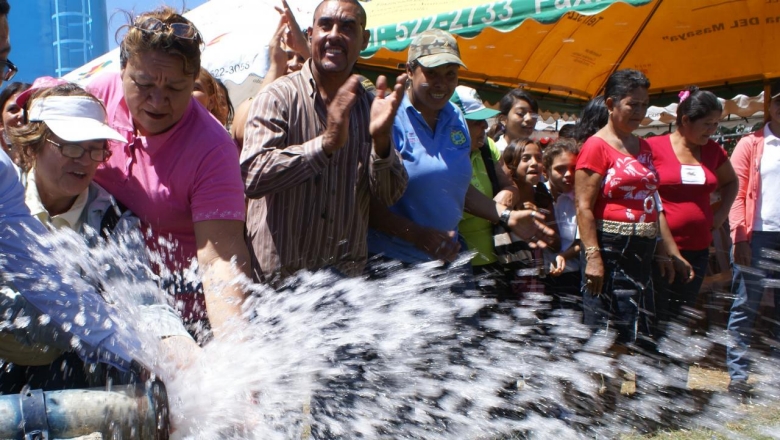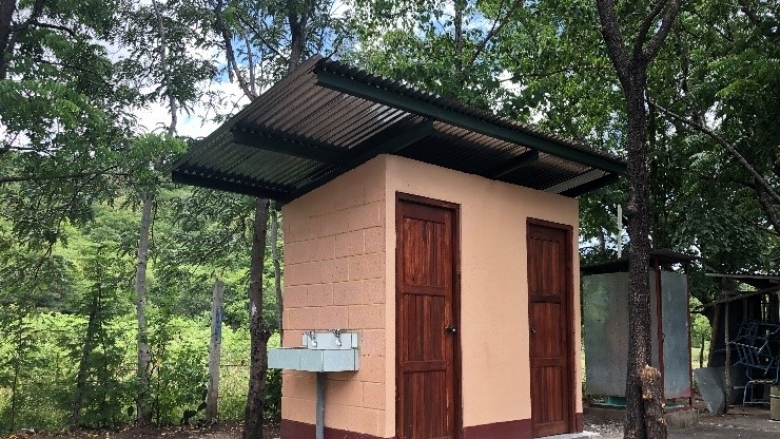Challenge
Nicaragua has made solid progress in the water supply and sanitation (WSS) sector over the past two decades. One of the poorest countries in Latin America in the mid-2000s, with around 48 percent of the population living below the poverty line, by 2016 the poverty rate had fallen to around 25 percent, and the nation had achieved Millennium Development Goals for access to water supply services. Nonetheless, the country continued to face large disparities in access to WSS between urban areas (98 percent access to water supply and 63 percent to sanitation) and rural areas (68 percent access to water supply and 37 percent to sanitation). This gap was even wider between the Pacific coast and the North and South Caribbean Coast Autonomous Regions, where the majority of Nicaragua’s Indigenous populations live. Lack of infrastructure investments combined with lack of institutional capacity to provide adequate support for operation and maintenance were identified as the main reasons for the gap. A Water Law, passed in 2007, provided a legal framework for the sector, but despite relatively clear guidance on sector regulation, strategic planning, and urban service provision, a sector strategy for the rural WSS sector had yet to be defined by the end of the century’s first decade. In addition to these institutional and financial challenges, rural areas are also increasingly affected by the impacts of climate change, with exacerbated water stress in the country’s traditionally dry central highlands, putting additional constraints on the limited availability of water resources.
Approach
To address these challenges, Nicaragua, with support from the World Bank, embarked on a series of projects and analytical work that sought to define a strategy for the rural WSS sector; strengthen the capacity of the lead agency, the Emergency Social Investment Fund (Fondo de Inversión Social de Emergencia, FISE); implement the Sustainability Chain as the guiding institutional framework; and provide financing for infrastructure investments to increase access to rural WSS services. The first Rural Water Supply and Sanitation Project (Proyecto de Agua y Saneamiento Rural, PRASNICA), 2008–2015) contributed to increased access to WSS services in rural areas while defining the institutional framework for rural WSS. The successor project, the Sustainable Rural Water and Sanitation Project (Proyecto de Sostenibilidad del Agua y Saneamiento Rural, PROSASR, 2014–2019), took developed the sector further by integrating the Sustainability Chain across different levels of government, strategically strengthening institutional capacities at the national, regional, municipal, and community levels to provide communities with sustainable services. In parallel, the Adaptation of Nicaragua’s Water and Sanitation Sector to Climate Change Project (Proyecto de Adaptación al Cambio Climático para Agua y Saneamiento, PACCAS, 2012–2018) supported Nicaragua in piloting the mainstreaming of climate change adaptation into water resources management and water supply in rural areas to help the country adapt to climate-related challenges and increase the resilience of their rural communities.
Results
Through this series of projects over the past fifteen years, culminating in the PROSASR project, recently concluded in September 2019, Nicaragua established a solid institutional sector strategy that leverages all levels of government to provide sustainable WSS services to rural communities across the country. The key approach guiding the sector is the Sustainability Chain, which defines a series of roles for each stakeholder at all levels of government to ensure that rural WSS services are embedded in solid planning, execution, and operation and maintenance phases to ensure the sustainability of services into the future.
Specific results of the PROSASR project supporting the Sustainability Chain include:
• A sound sector planning approach in which municipalities develop WSS plans that outline existing gaps and set priority actions for the rural WSS sector.
• Analytical data collected and curated through the National WSS Information System (Sistema de información de agua y saneamiento rural, SIASAR), utilizing data from all municipalities in the country to allow for coordinated and strategic sector planning; 151 out of 152 municipalities updated for sector planning and decision-making activities in the latest of the triennial SIASAR data updating cycles in 2019.
• Community-based WSS committees (Comité de Agua Potable y Saneamiento, CAPS) established to take charge of the planning, supervision, and management of community WSS systems, including a systematized performance matrix to evaluate and strengthen CAPS capacity. The project increased the number of CAPS considered sustainable from 13 percent in 2017 to 89 percent in 2019.
• A strong gender focus in capacity building strategies that resulted in CAPS management board representatives being more than 30 percent women (15 of 74 CAPS had a female president; 48 had a female treasurer).
• An integrated support structure across all levels of government — including FISE at national level, regional advisors, municipal WSS teams, and CAPS at the community level — for the planning, preparation, execution, and long-term management phases of each community WSS system.
• Targeted tools to support the different project cycles, including a sector-wide implementation manual for rural WSS; a range of training workshops to strengthen institutional capacity across all levels on a broad scale; the above-mentioned SIASAR information system; and Indigenous People Plans specifically supporting Afro-Nicaraguan and Indigenous communities in the Caribbean coast of the country.
• Climate-change vulnerability plans developed for and incorporated into the planning process for rural WSS systems.
• Targeted hygiene and sanitation behavior-change campaigns, which reached 46,885 persons by 2019.
• And, not least, almost 45,000 beneficiaries with sustainable access to water supply and almost 20,000 beneficiaries receiving sustainable access to sanitation as result of the PROSASR’s implementation of 75 subprojects in selected poor rural areas of Nicaragua.
Bank Group Contribution
The World Bank, through the International Development Association (IDA), provided financing in the amount of US$ 30 million for this project. Over the past fifteen years, the Bank supported Nicaragua’s rural WSS sector development through a series of interventions. In 2008, it financed the PRASNICA project with US$ 26.0 million IDA financing. In 2012, the Global Environmental Facility (GEF) supported the sector with a US$ 6.0 million grant for the PACCAS project in 2012. In 2014, the Bank provided additional support through the PROSASR project with US$ 30.0 million IDA financing. Between 2014 and 2017, the Bank provided technical support to help strengthen institutional policy and planning capacity in Nicaragua through the multi-donor Water and Sanitation Program Trust Fund in the amount of around US$ 600,000. Between 2014 and 2019, the Strategic Impact Evaluation Fund funded an impact evaluation study of the PROSASR project with a total amount of US$ 400,000. The multi-donor Trust Fund Global Water and Sanitation Partnership provided additional funding of around US$ 50,000 for a South-South Knowledge Exchange with Costa Rica and to develop lessons learned from the experiences of the Sustainability Chain.
Partners
The Bank has been one of the leading partners for the development of the rural WSS sector in Nicaragua over the past two decades. During that time, the Bank has maintained an ongoing dialogue with relevant sector partners, including the Swiss Cooperation Agency and the German Development Bank (KfW). Further, the Bank has established a close collaboration with the Central American Bank for Economic Integration (CABEI), resulting in leveraging US$ 30.0 million to finance an operation parallel to the PROSASR project in 2014. CABEI’s operation aligns with the sector strategy and contributes to the PROSASR development objectives to increase access to rural WSS services and to strengthen capacities at municipal and community levels in Nicaragua.
Beneficiaries
Access to safe water and sanitation is one of the most basic needs of Nicaragua’s communities. These communities highly value the investments made by the government and the capacity building they have received to manage these systems. The project also provides a platform to resolve some of the most pressing issues communities face beyond access to water supply and sanitation. The process can take time to reach the more remote communities and their members. Discussions around adequate levels of tariffs can be especially challenging; with the right guidance and support, however, CAPS members can explain the importance of tariffs to other community members.
Moving Forward
All support provided to the Government of Nicaragua in the past fifteen years aimed at strengthening the development of the government’s rural WSS sector strategy known as the Sustainability Chain. While a solid institutional framework has been created to accelerate sustainable access to water supply and sanitation services in rural areas across the country, investment needs remain high. To achieve universal access by 2030, an estimated sector investment of US$2 billion to US$3 billion is needed over the next decade. Furthermore, the established institutional structures require continuous support to keep advancing sector development. Specifically, the municipal WSS teams require sufficient funding and resources to provide technical support to all communities within their territorial responsibility. CAPS have received solid initial capacity building to conduct their roles and responsibilities, but ongoing support is needed to maintain their performance. It is therefore necessary for Nicaragua to continue investing in the rural WSS sector in ways that will allow it to scale up successes achieved to date and reach universal access to rural WSS services nationwide.
Learn More
NI Sustainable Rural Water Supply and Sanitation Sector Project (2014-2019). Project summary and results. World Bank website.
SIASAR – Rural Water Supply and Sanitation Information System in Nicaragua. Latest data on progress towards universal access to WSS.

